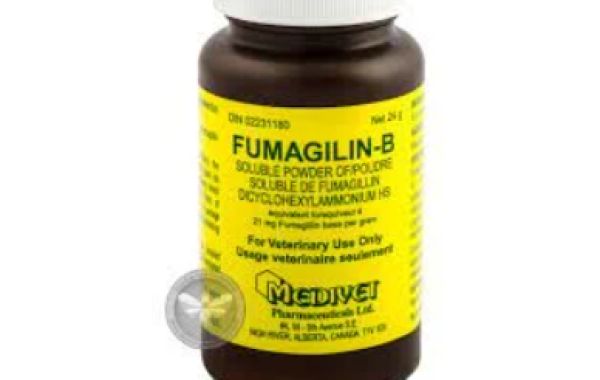Are you looking for a powerful anti-microbial and anti-tumor agent? Look no further than Fumagillin! This naturally occurring compound has been found to have incredible potential in combatting both bacterial infections and cancer cells. In this blog post, we will delve into the science behind Fumagillin's mechanism of action, its impressive antimicrobial activity, its promising results in fighting tumors, and the latest updates on clinical trials involving this potent substance. Join us as we explore the exciting world of Fumagillin!
What is Fumagillin?
Fumagillin is a natural compound that was first discovered in the 1950s in the fungus Aspergillus fumigatus. The discovery of Fumagillin sparked great interest among scientists due to its potent anti-parasitic properties. It wasn't until later, however, that researchers began to uncover its wide-ranging antimicrobial and anti-tumor potential.Fumagillin works by inhibiting an enzyme called methionine aminopeptidase-2 (MetAP2), which plays a key role in many cellular processes including protein synthesis and DNA repair. By blocking MetAP2 activity, Fumagillin disrupts these crucial cellular functions and causes cell death.Due to its broad-spectrum activity against bacteria, fungi, parasites, and cancer cells, Fumagillin has become an attractive target for drug development efforts. In fact, several analogues of Fumagillin are currently being investigated as potential treatments for various infectious diseases and cancers.While there is still much research needed to fully understand the mechanisms behind Fumagillin's impressive capabilities, this unique natural compound holds great promise as a versatile therapeutic agent with many potential applications.

Fumagillin's Mechanism of Action
Fumagillin is a natural product derived from the fungus Aspergillus fumigatus. It is known to have potent anti-microbial and anti-tumor properties, making it an exciting area of research for drug development. But how does Fumagillin actually work?The mechanism of action of Fumagillin involves targeting a specific enzyme in cells called methionine aminopeptidase 2 (MetAP2). This enzyme plays an important role in protein synthesis and cell growth.Fumagillin works by inhibiting MetAP2, which disrupts the normal functioning of the cell cycle and ultimately leads to cell death. Specifically, Fumagillin prevents the attachment of new amino acids to growing polypeptide chains during translation.Interestingly, Fumagillin’s inhibition of MetAP2 also has downstream effects on other signaling pathways that are important for cellular processes such as angiogenesis (the formation of new blood vessels) and inflammation.Fumagillin's unique mechanism of action makes it an attractive target for therapeutic development against various diseases.

Fumagillin's Antimicrobial Activity
Fumagillin's antimicrobial activity is one of its most promising properties. This compound has been shown to be extremely effective against a variety of pathogens, including viruses, bacteria and fungi. One study found that fumagillin was able to inhibit the growth of several strains of E. coli, as well as Staphylococcus aureus.Interestingly enough, fumagillin seems to have a unique mechanism for attacking microbial cells. Rather than targeting the cell membrane or DNA like many other antibiotics do, it inhibits enzymes involved in protein synthesis and energy production within the cell.This makes it less likely for microbes to develop resistance against fumagillin compared to traditional antibiotics that target only specific parts of microorganisms. Furthermore, this unique mode of action also means that using Fumagilin B could potentially help prevent antibiotic resistance from developing in the first place.Fumagillin's broad-spectrum antimicrobial activity could make it a powerful tool in fighting drug-resistant infections and improving public health outcomes worldwide if further research can confirm its safety and efficacy on humans.
Fumagillin's Anti-Tumor Activity
Fumagillin's Anti-Tumor Activity:
One of the most promising aspects of Fumagillin is its anti-tumor activity. It has been found to inhibit angiogenesis, which is the process by which tumors develop new blood vessels to nourish themselves and grow. This makes it a potential weapon against cancer.Several studies have demonstrated that Fumagillin can effectively suppress tumor growth in animal models. In one study, mice with colon cancer were treated with Fumagillin and showed a significant reduction in tumor size compared to control groups.Furthermore, research has shown that combining Fumagillin with chemotherapy drugs such as cisplatin or paclitaxel can enhance their effectiveness against tumors. This suggests that Fumagillin could be used as an adjuvant therapy for cancer treatment.Despite these promising findings, more research is needed to fully understand how Fumagillin works against tumors and how it can be best utilized in clinical settings. Nonetheless, the potential benefits make it an exciting area of study for researchers looking for new treatments for cancer.

Clinical Trials with Fumagillin
Clinical Trials with Fumagillin have shown promising results in the treatment of various types of cancer. In a phase II clinical trial, fumagillin was tested on patients with advanced melanoma, and the results showed that it had some efficacy as an anti-tumor agent. Another study found that fumagillin could inhibit angiogenesis in colorectal cancer cells and increase overall survival rates.One of the most significant advantages of fumagillin is its specificity for tumor cells, meaning that it doesn't affect healthy cells. This makes it a safer option than other chemotherapy drugs which can damage healthy tissue.However, despite these positive findings, more research is still needed to determine how effective fumagillin is at treating different types of cancers and what side effects might arise from its use.While there is still much work to be done before Fumagillin becomes widely available as an anti-cancer drug; its potential benefits make it an exciting area for further exploration within oncology research.
Conclusion
Fumagillin has shown great potential as a potent anti-microbial and anti-tumor agent. Its unique mechanism of action makes it an attractive candidate for the development of new drugs to combat infectious diseases and cancer. While clinical trials have demonstrated promising results, further research is still needed to fully understand its safety and efficacy in humans.Fumagillin represents an exciting area of research with the potential to make a significant impact on public health. As scientists continue to explore its therapeutic properties, we can look forward to new treatments that may one day eradicate deadly infections and cancers.








